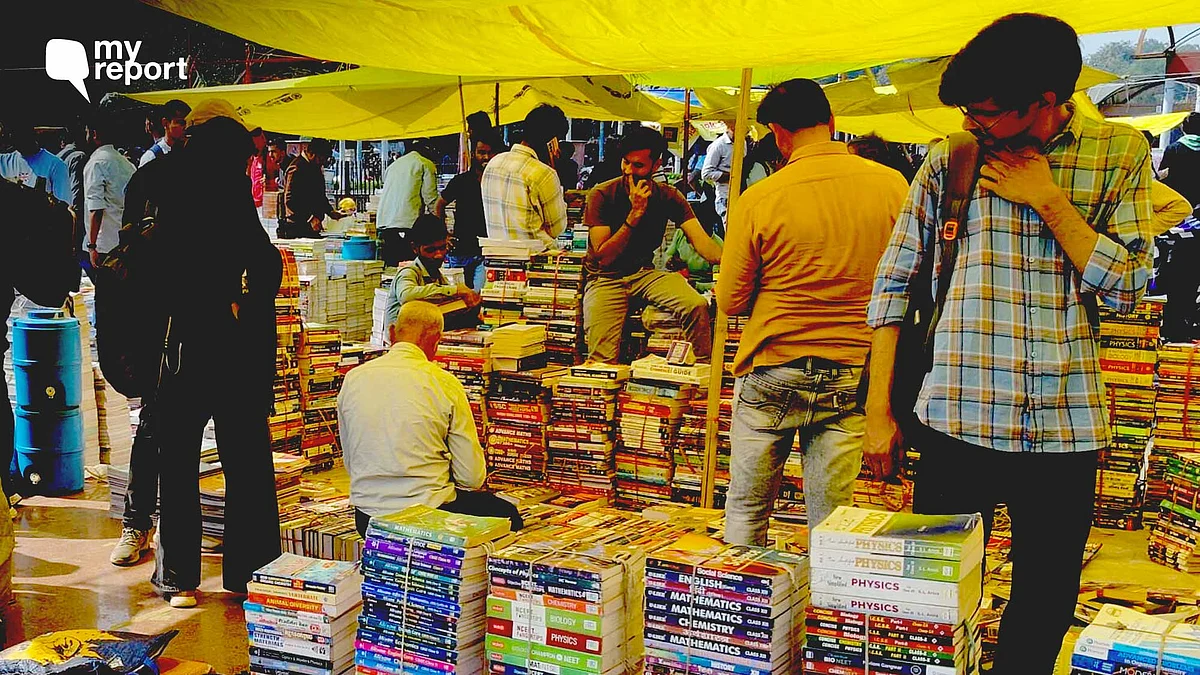
'Book Sales Were Falling, Shifting From Old Delhi’s Daryaganj Made It Worse'
While visitors to Mahila Haat leave satisfied every Sunday, the outlook is less promising for sellers.

advertisement
From once lining the streets of Daryaganj to now being held at Mahila Haat, the Sunday book market remains a haven for book lovers in Delhi. While booksellers have yet to fully adjust to the market’s relocation in 2019, they continue to set up their stalls each week with the same zeal and fervour that has attracted readers since 1964, when the market was first established.
However, these sellers face numerous challenges in sustaining this bazaar, which has become a part of Delhi’s living heritage.
The Tale of Declining Sale
Known for its eclectic collection of second-hand books at highly affordable prices, the Daryaganj Sunday book market has something to offer everyone who stops by.
It features books ranging from classics by Leo Tolstoy, Charles Dickens, and Jane Austen to study guides, textbooks, and competitive exam books, attracting students like me from a wide range of academic backgrounds.While visitors to Mahila Haat every Sunday leave satisfied, the outlook is less promising for sellers.
Sanjay, one of the booksellers, laments the decline in sales since the market was shifted from its previous stretch between Delite Cinema and Golcha Cinema.
The Sunday-weekly book market at Mahila Haat in Old Delhi is witnessing a serious issue of declining sales.
(Photo credit: Shambhavi Srivastava)
Mahila Haat is on an elevated platform, accessible via a short set of stairs or a crude ramp. Transporting books up is a challenge in itself. Many sellers have to hire loaders, which increases their costs and hurts their pockets.
Sellers say that trolleys sometimes overturn while carrying books, and for elderly sellers, climbing the stairs or the ramp with their stock is nothing short of a struggle.
Since Mahila Haat is at an elevated platform, elderly sellers find it hard to load and unload books while managing their stalls.
(Photo credit: Shambhavi Srivastava)
Another vendor, Jagdish, points out that, owing to the change of location, their work has reduced while costs have surged.
He says that his sales improved for two to three months starting in March, but the rest of the year was marked by a slump. There are other issues too.
Jagdish, one of the booksellers, near his stall at the Mahila Haat in Old Delhi.
(Photo credit: Shambhavi Srivastava)
A wedding ceremony had been held just before Sunday, 8 March, when I visited the market, and one could see half-undone tents, rolled-up mats, and sofas still lying around.
Small heaps of garbage scattered around gave off a foul stench, making it difficult to stand in one place for long. Amidst this, the sellers had set up their stalls.
Only Source of Income For Many
The anguish was clearly visible on Mukesh’s face when buyers asked for books he did not have. He has been coming to the Daryaganj market for the last 25 years, and today, it is his sole source of income, as he had to close down other work during the pandemic. But his earnings are hardly sufficient to support his family.
Since the market is open-air, sellers have to face the brunt of all kinds of changing weather conditions.
(Photo credit: Shambhavi Srivastava)
"This is an open space, and it becomes very difficult to manage during rain or the scorching heat of Delhi. In fact, on many days when it rains or there is a public holiday, we are not even able to put up a stall, losing that week’s income,” he told me.
The place does have some covered structures, but many of them are in poor shape, and their poles are instead used to tie together tarpaulin sheets to provide some respite from the heat in the summer.
But even this comfort is not available to everyone—especially not to those like Mukesh, who are unable to secure a spot near these structures.
I found Mukesh towards the end of the market, where he explained how many sellers capture large areas at the front, forcing others to the back. This affects sales because if buyers find enough books at the beginning of the market, they might not venture further inside.
A section of the covered structure in a broken state.
(Photo credit: Shambhavi Srivastava)
Just like Mukesh, the market is Asha’s only source of income. Over the 25 years she has spent selling books here, she has witnessed a drastic change in readers' interests.
Mukesh, one of the many book sellers, have to set up the stall in the open air.
(Photo credit: Shambhavi Srivastava)
There are many like Mukesh and Asha for whom the Sunday book market is their bread and butter. For others, too, who have an additional source of income—such as working as a salesperson at someone else’s shop—a major portion of their earnings comes from this weekly toil.
Sellers reach Mahila Haat around 6 or 7 in the morning to set up their stalls and stay until 6 in the evening, working for 11–12 hours, but the returns are rarely satisfactory. Regardless, they keep returning in the hope of better times.
(All 'My Report' branded stories are submitted by citizen journalists to The Quint. Though The Quint inquires into the claims/allegations from all parties before publishing, the report and the views expressed above are the citizen journalist's own. The Quint neither endorses nor is responsible for the same.)
- Access to all paywalled content on site
- Ad-free experience across The Quint
- Early previews of our Special Projects
Published: undefined